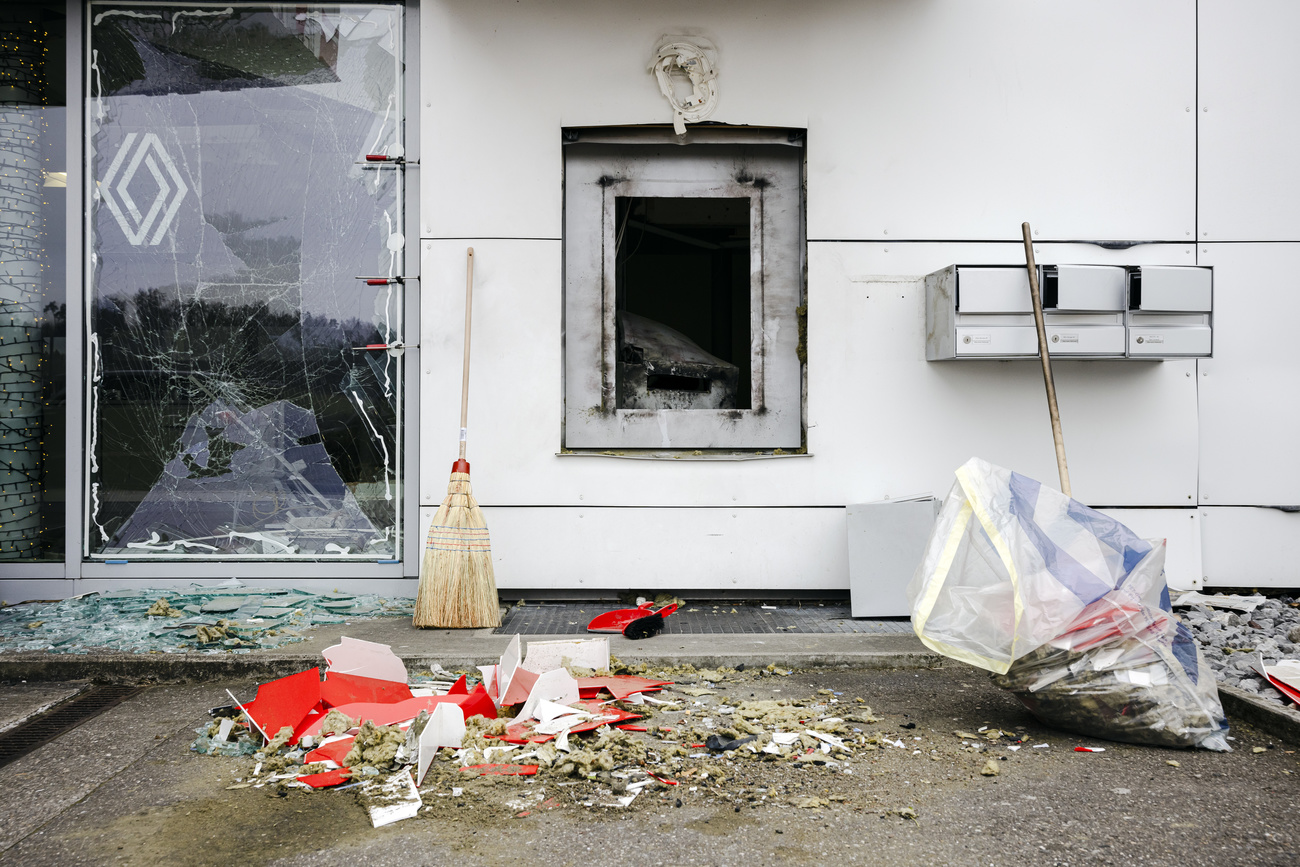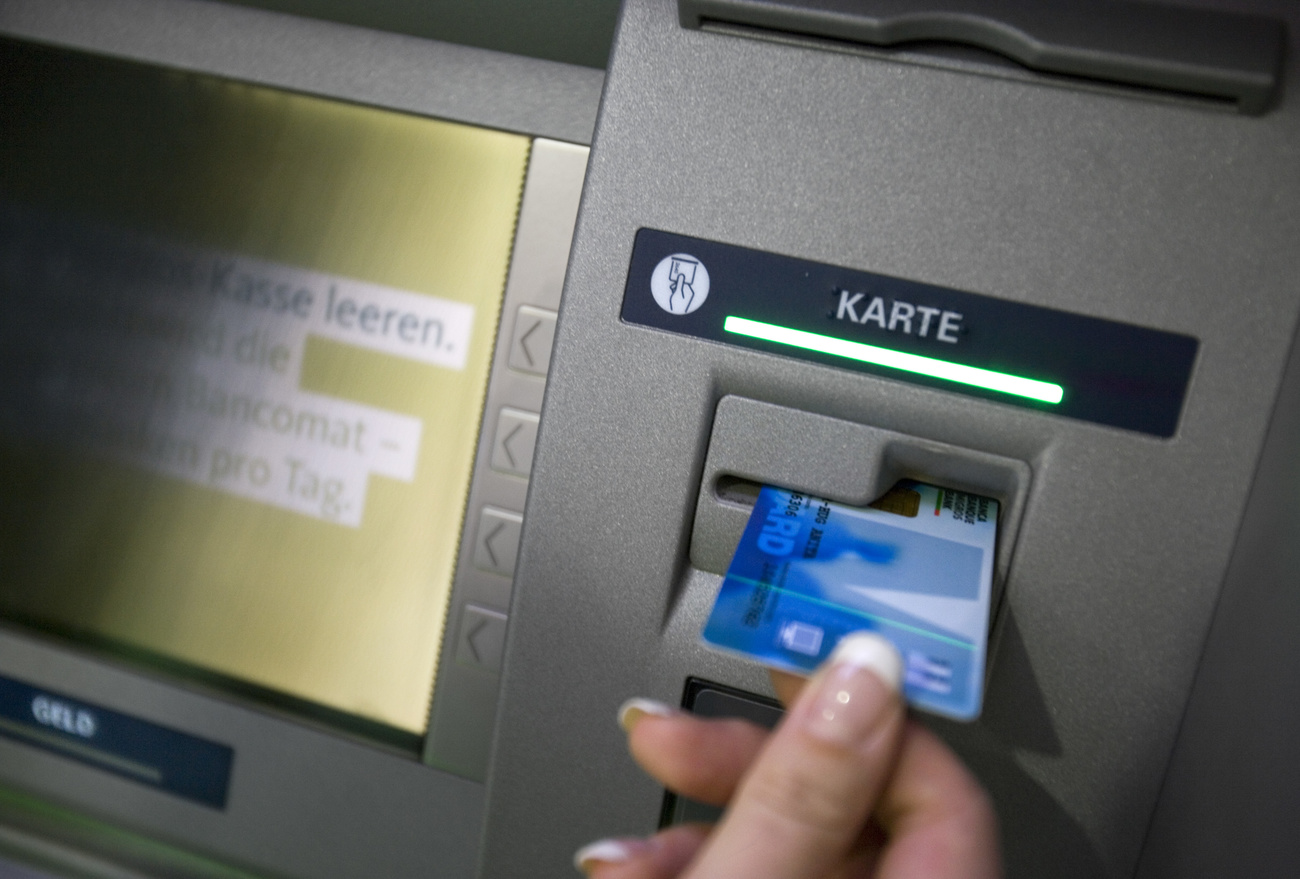Politicians sound alarm over ATM attacks in Switzerland

Ruthless, highly-organised foreign criminal gangs are behind many of the ATM attacks that continue to rock small Swiss towns and villages, say police. In response, concerned politicians are proposing measures to tighten border security.
Check out our selection of newsletters. Subscribe here.
On Monday night residents of the sleepy village of Jegenstorf in canton Bern were woken at 2am by a blast that wrecked their local bank’s cashpoint machine. The explosion also caused considerable damage to the bank building. Police saidExternal link witnesses spotted three people dressed in dark clothing fleeing on foot. It was unclear how much money was stolen.
One-and-a-half hours later that same night, thieves blew up an ATM at a gas station in Küssnacht am Rigi in central Switzerland. The machine was destroyed and the shop damaged. There were no injuries, but the Schwyz cantonal police assume the criminals fled with the machine’s cash.
These spectacular raids are part of a crime wave that has plagued Switzerland and other European countries, especially GermanyExternal link, for the past six years, terrorising residents with night-time detonations mostly in small towns and villages not far from the borders.
“The phenomenon affects the whole of EuropeExternal link, not just Switzerland. However, Switzerland is and remains an attractive target for ATM attackers,” Federal Office of Police (Fedpol) spokesperson Mélanie Lourenço told SWI swissinfo.ch.
The police blame gangs of foreign criminals who slip over the border into wealthy Switzerland, blow up poorly-protected cash machines in remote villages and make off with thousands of Swiss francs. Cash remains a popular form of making payments in Switzerland compared to some other European countries.
Attacks have been rising steadily. In 2018, there was a total of 18 reported attacks against ATMs in Switzerland using solid explosives, gas and more basic methods like lassoing and ripping out the machine with a steel cable. This total figure climbed to 57 in 2022 before falling last year to 32.
Despite the drop in the overall number of attacks, ATM bombings are consistently high and continue to cause concern. Last year there were 19, and so far this year 15 cash machines have been destroyed in powerful blasts, according to Fedpol.

More
Thieves steal CHF1.5 million from ATMs in northern Switzerland since 2020
ATM attacks are ingenious and ruthless
The numbers only tell part of the story, say the Swiss police, who describeExternal link the gangsters as “ingenious, highly organised, quick and more ruthless than ever”.
Romanian gangs are responsible for around half of the heists using explosive devices. They began targeting ATMs across Europe 20 years ago, including machines in Switzerland, Fedpol wroteExternal link in its 2023 annual report published last month.
Investigations indicateExternal link that criminals rent premises in neighbouring countries as a base for planning and logistical purposes. The raids are typically carried out by three or four people who often use several vehicles, sometimes stolen, and false number plates.
Speed is of the essence – the raids take no more than four to five minutes, according to Fedpol – along with brute force to steal cash from an ATM.
Many of the other attacks are carried out by gangs from the Netherlands, often criminals of Moroccan origin, says Fedpol.
“They are young and part of a subculture that celebrates the ATM attacks in music videos. They launder the stolen money in Swiss casinos and are also believed to use the cash to fund drug deals,” it said in its annual report.
Catching the ATM busters
The Swiss authorities have so far had limited success in catching and convicting criminals involved in the attacks. The first criminal conviction of an ATM explosives attacker was handed down in 2021 when a Romanian national was sentenced to 74 months in prison. In 2022 a Dutch national was charged by federal prosecutors for being equipped to blow up cash machines in Switzerland. Working with French, Dutch, German and other authorities, Fedpol managed to make several arrests in 2023.
Other preventive measures are being taken. Last year the Swiss police held talks with financial service providers to find ways to combat the growing number of explosive attacks against cash machines.
“A further meeting with representatives of banks and ATM operators and manufacturers is planned for the autumn,” Lourenço told SWI.

More
International manhunt nets suspect linked to Swiss ATM blasts
Beyond the shock of the bombings, one direct consequence for villagers has been the disappearance of their local ATMs – for good.
Following a raid in the Swiss village of La Brévine on May 27, the local cantonal bank announced it was taking out of service several machines close to the border. Another cantonal bank in a border region, the Banque Cantonale du Jura, also restricted access to some ATMs after incidents this year.
Parliamentary initiative
The recent spate of attacks is likely to have political consequences. The right-wing Swiss People’s Party is reportedly preparing a parliamentary initiative aimed at tightening up security in border regions. The text proposes to reintroduce mobile border patrols 24 hours a day and to equip the main border crossing points with cameras.
In parallel, at the end of May, People’s Party delegates approved the launch of a popular initiative calling for the return of systematic border checks.

More
How are you? What is on your mind? Take part in our big survey
Swiss parliamentarian Yvan Pahud, who is behind the parliamentary initiative, lives in Sainte-Croix close to the French border. He used to work as a border guard. “When I did my training in the 2000s, all the border posts were guarded round the clock. Then they closed the small border posts and replaced the checks with mobile teams. Now these teams are hardly ever active at night. For the criminals, it’s an open bar,” he told Le Matin Dimanche newspaper.
The Federal Office for Customs and Border Security says it has the capacity to extend surveillance as required. Last month the government announced it plans to step up border checks during the European Football Championships in Germany and the Olympic Games in Paris. But this will have an impact on staffing levels and costs.
Fabien Fivaz, a Green Party parliamentarian from Neuchâtel, says money is indeed the main problem when it comes to increasing border controls. He said: “Fears sparked by this spate of ATM attacks call for a political response. This could involve stepping up the number of mobile teams, as this would respect the EU Schengen Accord. If the People’s Party agrees to finance these additional measures with funds from the army’s budget, then I’m prepared to go along with it.”
The Swiss federal government has so far refrained from taking specific measures to deal with ATM attacks. In reply to a parliamentary questionExternal link last year by centre-right Radical Olivier Feller, the government said it recommended waiting for the conclusions of expert meetings on this issue, “which should lead to the creation of common, coordinated best practices that can apply to all of Switzerland”.

More
Fedpol chief: ‘Swiss police resources insufficient to fight Mafia’

In compliance with the JTI standards
More: SWI swissinfo.ch certified by the Journalism Trust Initiative













You can find an overview of ongoing debates with our journalists here . Please join us!
If you want to start a conversation about a topic raised in this article or want to report factual errors, email us at english@swissinfo.ch.